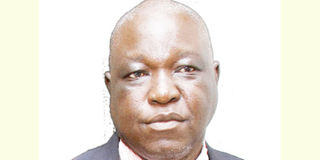The Women’s Hospital International sued

Dr Sylvester Onzivua
What you need to know:
It was established through a postmortem examination that the anesthetist wrongly inserted the tube to supply the patient oxygen and anesthesia during the operation into her oesophagus instead of her trachea
On the 14th day of October 2010 a 34 year woman died at the Women’s Hospital International, Kampala at the beginning of a surgical operation to remove a single fibroid from her uterus. The procedure used was laparoscopic surgery and a doctor from Nairobi was specially hired to carry out the procedure. The doctor was not registered, as required by law, to practice medicine in Uganda and neither did he get a temporary practicing certificate.
It was established through a postmortem examination that the anesthetist wrongly inserted the tube to supply the patient oxygen and anesthesia during the operation into her oesophagus instead of her trachea. As a result of this wrong intubation the patient suffered cardiac arrest and died despite attempts to resuscitate her.
The elder sister of the patient filed a civil suit against the hospital for and on behalf of the family for the recovery of damages for loss of support and dependency, loss of life expectation, general damages, special damages, interest and costs of the suit.
Issues to be determined by court
The following were the issues for court to determine;
Whether the death of the patient was as a result of negligence
Whether the theatre in the Women’s Hospital International was fit to provide safe and skilled anesthesia for laparoscopic surgery
Whether the doctor hired from Nairobi was liable for negligence for practicing medicine in Uganda without the requisite statutory registration
What remedies were available to the parties?

Civil cases
Civil cases are guided by principles different from that of criminal cases. Litigants in civil cases often seek for compensation in forms of money and also restraining orders or upholding particular positions. In civil matters, a party may be sent to a civil prison if he or she fails to abide by the orders of the court.
In civil cases all witnesses are expected to testify under oath and are subjected to cross-examination. The defendant may choose not to testify but this is often detrimental and counterproductive.
In civil matters, courts will decide a matter on “the balance of probabilities”; that is which version of events is more persuasive to court. Nevertheless, there is a minimal standard of proof required by these courts. And the courts will only award or grand what is expressly asked for; nothing more and nothing less so long as it meets the standards of proof and is reasonable and backed by law and supported by other decided cases.
Guidelines in dealing with cases of medical negligence
The court reviewed basic principles as derived from leading cases of medical negligence in the country and other common law jurisdictions and used these guidelines to determine whether there was medical negligence in this particular case
Court defined negligence as the breach of a duty exercised by omission to do something which a reasonable man would do or do something which a prudent and reasonable man would not do. The act or omission complained of must be culpable or gross and not merely based upon an error of judgment.
The medical profession is expected to offer a patient reasonable care and courts will not impose on the medical profession the highest or the lowest degree (bare minimum) of care and competence. The courts will determine a case in the light of the particular circumstances of each case in accordance with the law. The medical practitioner will only be liable (held responsible) if his or her contact falls below the standards of a reasonably competent practitioner in his or her field.
In the realm of diagnosis and treatment there is scope for genuine difference of opinion and one doctor is clearly not negligent merely because his or her diagnosis and management differs from that of another doctor. When one doctor chooses one course of action in preference to another one available, the doctor should not be held liable if the course of action chosen by him or her is acceptable to the medical profession even if something went wrong during this particular action. Negligence should therefore not be attributed to a doctor as long as he performs his duties with reasonable skill and care. It would not be conducive to the efficacy of the medical profession if no doctor could practice medicine without having to look over his or her shoulder.
It is the bounden duty and obligation of the civil society to ensure that medical professions are not harassed or humiliated to enable them perform their duties without fear or apprehension. The medical practitioners at times have to be saved from such a class of complainants who use the criminal process as a tool for pressurizing them for extracting uncalled for compensation. This particularly affects private hospitals or clinics. Such malicious proceedings deserve to be discarded against the medical practitioners.
The medical professionals are entitled to get protection from the law as long as they perform their duties with reasonable skill and competence and in the interest of the patient. The interest and welfare of the patients have to be paramount for the medical professions.
To be continued




